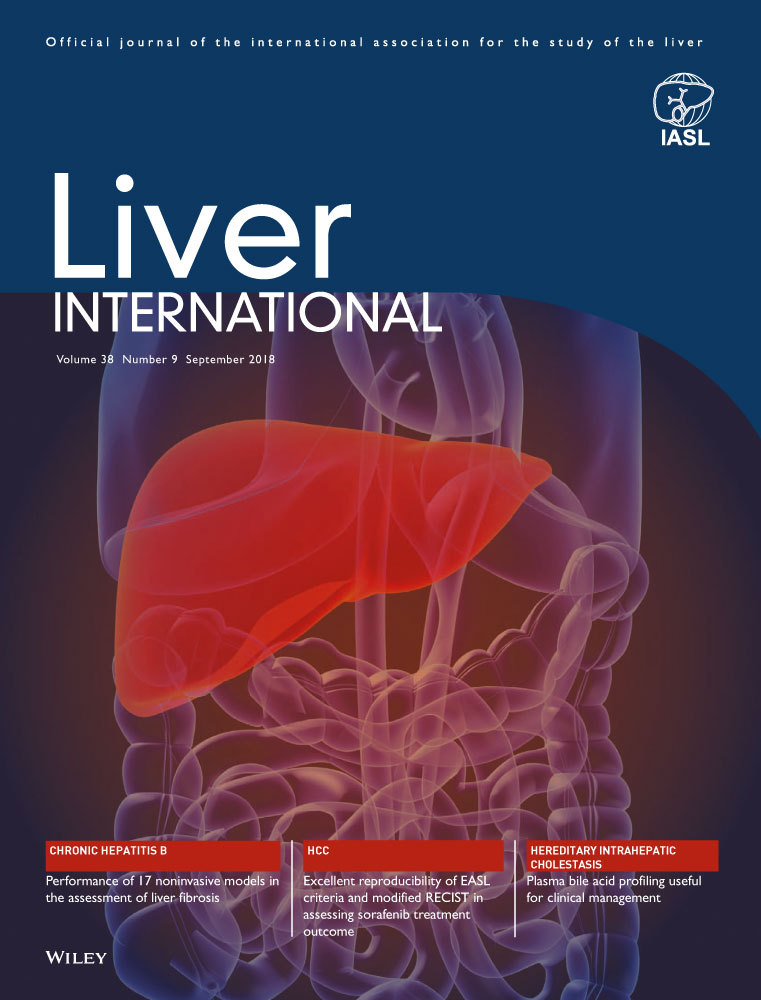Ledipasvir-sofosbuvir for treating Japanese patients with chronic hepatitis C virus genotype 2 infection
Funding information
Funding for this study was provided by Gilead Sciences, Inc.
Abstract
Background & Aims
Japanese patients with chronic hepatitis C virus (HCV) genotype 2 infection have high rates of sustained virological response (SVR) following 12 weeks of treatment with the nucleotide polymerase inhibitor sofosbuvir in combination with ribavirin, which was the standard of care at the time this study was undertaken. We assessed the efficacy of 12 weeks of treatment with a ribavirin-free regimen of ledipasvir-sofosbuvir.
Methods
In an open-label, Phase 3 trial we enrolled Japanese patients with chronic HCV genotype 2 infection, with or without compensated cirrhosis. In Cohort 1, participants were randomized 1:1 to receive ledipasvir-sofosbuvir (n = 106) or sofosbuvir + ribavirin (n = 108) for 12 weeks. In Cohort 2, 25 ribavirin-intolerant or -ineligible patients received ledipasvir-sofosbuvir for 12 weeks. The primary endpoint was SVR 12 weeks after therapy (SVR12). In Cohort 1 non-inferiority was assessed with a prespecified margin of 10%.
Results
One-third (33%) of patients were treatment experienced, and 14% had cirrhosis. In Cohort 1, SVR12 rates were 96% (95% CI, 91% to 99%) with ledipasvir-sofosbuvir and 95% (95% CI, 90% to 98%) with sofosbuvir plus ribavirin, thus achieving non-inferiority. Among ribavirin-intolerant/ineligible patients in Cohort 2, SVR12 was 96% (95% CI, 80% to 100%) with ledipasvir-sofosbuvir. Overall, the most common adverse events were nasopharyngitis, anaemia, and headache; anaemia was only observed in patients receiving ribavirin. The percentage of patients who discontinued treatment because of an adverse event was low (1%).
Conclusions
Among Japanese patients with HCV genotype 2, 12 weeks of treatment with ledipasvir-sofosbuvir resulted in high rates of SVR12 that were non-inferior to sofosbuvir + ribavirin.
CONFLICTS OF INTEREST
Yasuhiro Asahina has served as an investigator for Toray, Gilead, AbbVie, Chugai and MSD. Yoshito Itoh has served as an investigator for MSD, BMS, Gilead, Abbvie, Ono, Daiichi-Sankyo, Astellas, Takeda, Ajinomoto, SDP, Fujifilm, Otsuka, Novo, Mitsubishi, Kyorin, Chugai, Serono, GSK, AZ and NichiNichi. Yoshiyuki Ueno has served as an investigator for BMS, MSD, AbbVie, EA Pharma and Gilead. Yasushi Matsuzaki has served as an investigator for Mitsubishi, MSD, Ajinomoto, Eisai, DSP, AbbVie, Daiichi-Sankyo, Toray, Minophagen, Otsuka, Kyowa-Kirin, Gilead and Janssen. Yasuhiro Takikawa has served as an investigator for SDP, Chugai, Torii, Tejin, Takeda, EA Pharma, MSD, Asuka, Esai, Toray, AsahiChemical and Shionogi. Hiroshi Yatsuhashi has served as an investigator for Chugai. Takuya Genda has served as an investigator for Gilead and Chugai. Fusao Ikeda reports no conflicts of interest. Norifumi Kawada has served as an investigator for Gilead. Nobuyuki Enomoto has served as an investigator for Gilead, BMS, AbbVie, and MSD. The following authors are employees of Gilead Sciences and may hold stock interest in the company: Takuma Matsuda, Hadas Dvory-Sobol, Deyuan Jiang, Benedetta Massetto, Anu O. Osinusi, Diana M. Brainard and John G. McHutchison.




